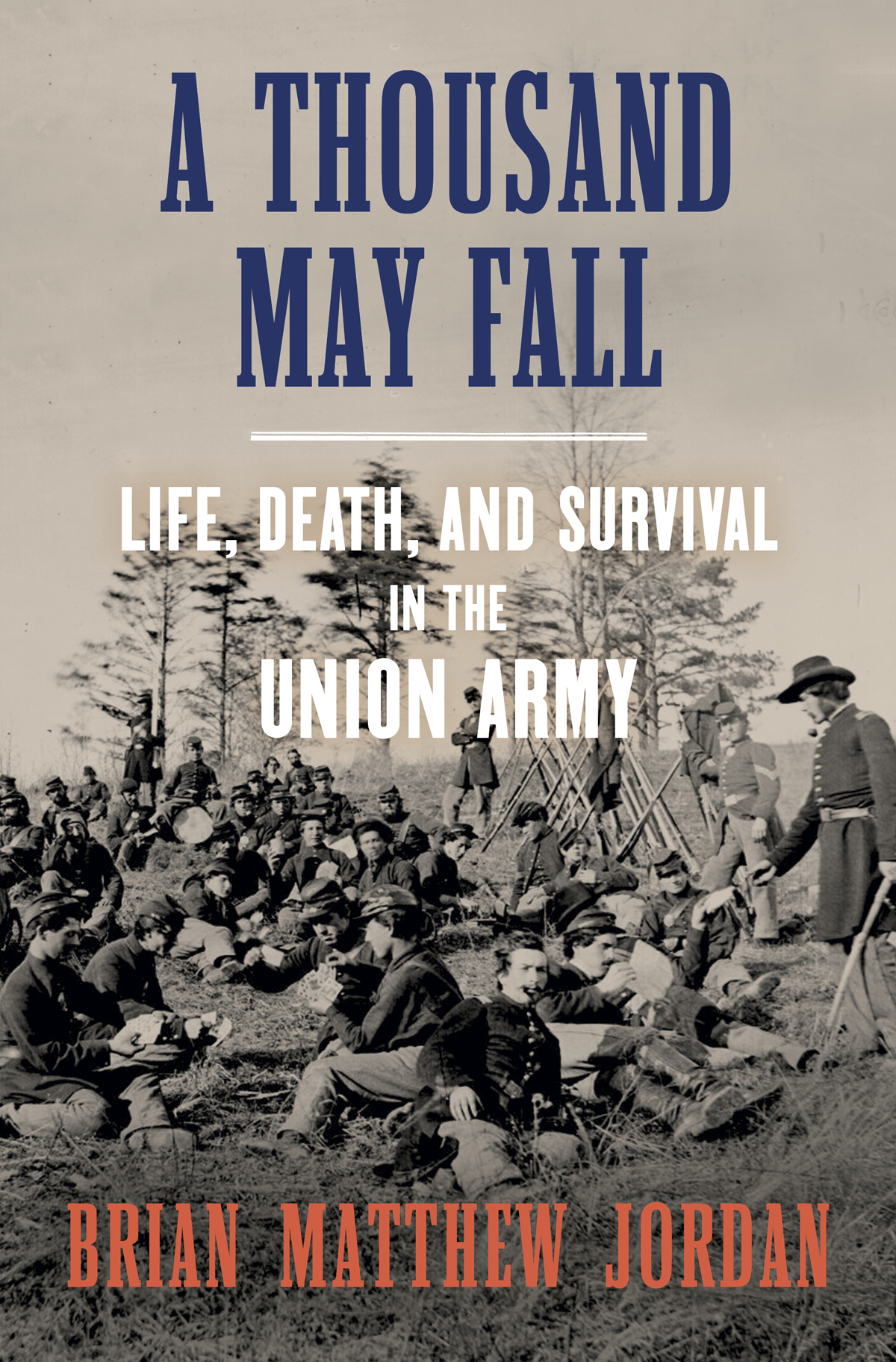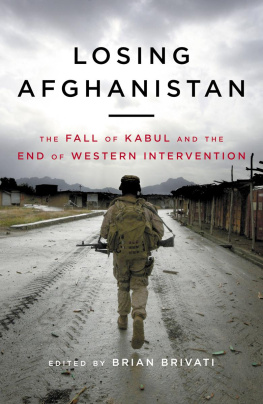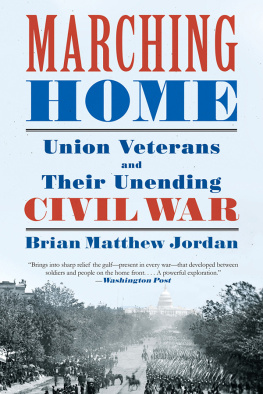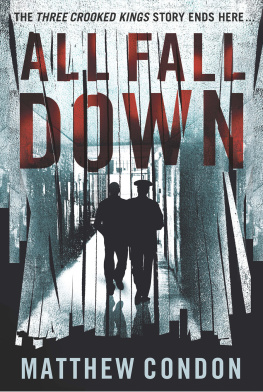Brian Matthew Jordan - A Thousand May Fall
Here you can read online Brian Matthew Jordan - A Thousand May Fall full text of the book (entire story) in english for free. Download pdf and epub, get meaning, cover and reviews about this ebook. year: 2020, publisher: Liveright, genre: Politics. Description of the work, (preface) as well as reviews are available. Best literature library LitArk.com created for fans of good reading and offers a wide selection of genres:
Romance novel
Science fiction
Adventure
Detective
Science
History
Home and family
Prose
Art
Politics
Computer
Non-fiction
Religion
Business
Children
Humor
Choose a favorite category and find really read worthwhile books. Enjoy immersion in the world of imagination, feel the emotions of the characters or learn something new for yourself, make an fascinating discovery.

- Book:A Thousand May Fall
- Author:
- Publisher:Liveright
- Genre:
- Year:2020
- Rating:4 / 5
- Favourites:Add to favourites
- Your mark:
- 80
- 1
- 2
- 3
- 4
- 5
A Thousand May Fall: summary, description and annotation
We offer to read an annotation, description, summary or preface (depends on what the author of the book "A Thousand May Fall" wrote himself). If you haven't found the necessary information about the book — write in the comments, we will try to find it.
A Thousand May Fall — read online for free the complete book (whole text) full work
Below is the text of the book, divided by pages. System saving the place of the last page read, allows you to conveniently read the book "A Thousand May Fall" online for free, without having to search again every time where you left off. Put a bookmark, and you can go to the page where you finished reading at any time.
Font size:
Interval:
Bookmark:

A THOUSAND
MAY FALL

Life, Death, and Survival
in the Union Army
BRIAN MATTHEW JORDAN

For My Dad
and
For the 107th Ohio Volunteer Infantry (18621865)
You will not fear the terror
of night, nor the arrow that flies by day,
nor the pestilence that stalks in the darkness,
nor the plague that destroys at midday.
A thousand may fall at your side,
ten thousand at your right hand,
but it will not come near you.
Psalm 91
CONTENTS
A THOUSAND
MAY FALL


Ohio in the Civil War
F ROM THEIR POSITION on the campus of the Adams County Almshousea trio of buildings that sat in a neat row along Gettysburgs northern edgethe Ohioans surveyed the wide, flat plain that extended between the Carlisle Road and the Harrisburg Pike. To the west, a sequence of sturdy ridges creased the ground, and an unfinished railroad trace gashed into the earth. Stone fences and stands of timber supplied the Union soldiers deployed there with a measure of protection; units huddled behind fence rails, beneath the crown of Oak Ridge, and in the fingers of the McPhersons Woods. But out here north of town there was no cover, no shelter, no refuge to be found. As they looked to their front on this warm July afternoon, the men spied only the slight earthen knob that locals called Blochers Knoll. War makes a habit of promoting otherwise unremarkable ripples in the ground to sudden significance, and in that respect, this day would be no different. Atop the forlorn rise, a precocious division commander unlimbered four Napoleon guns, shook out a skirmish line, and planted a tiny brigadestretching the thin blue ribbon coiled around Gettysburg just about as far as it would stretch.
Shot and shell soon winged overheadthe first portent of enemy soldiers massing for an assault. After what seemed a lifetime, the 107th Ohio Volunteer Infantry was nodded toward the knoll to brace the beleaguered Union line. They advanced with heavy steps and knotted throats, some inserting one last cheekful of tobacco. To be sure, such a daunting errand might have given any troops pause. But it was a distinct dread that flooded the Ohioans. Exactly two months before, at the battle of Chancellorsville, the men had been among the first troops crushed under the weight of Stonewall Jacksons flank attacka daring maneuver that delivered twenty-six thousand rebels to a federal line that derelict commanders had left dangling dangerously in the air. In mere minutes, Jacksons howling rebels added more than half of the regiment to the Civil Wars ever-lengthening register of killed, wounded, missing, and captured. Now, on this first July afternoon of the wars third summeronce more deployed on the right flank of a threadbare Union lineit seemed as though the past was repeating itself.
The prospect of still more death and suffering unnerved the men, but no more than the likelihood of another embarrassing defeat. For the last six weeks, the northern press had defamed the Ohioans and their comrades in the Army of the Potomacs Eleventh Corps as lily-livered cowards, consuming column inches with mocking editorials. A thrashing as thorough as the one the Yankee army took at Chancellorsville demanded a scapegoat, and hasty correspondents found one in the regiments that extended the federal line along the Orange Turnpike. Threats, entreaties, and orders of commanders, the Daily National Intelligencer harrumphed from Washington, D.C., were of no avail... Thousands of these cowards threw down their guns and soon streamed down the road toward headquarters. Even their comrades within the army joined in the insults. Every man [in the Eleventh Corps], one federal captain indignantly snorted, ought to be hauled off the face of the Earth.
With some clever wordsmithing, other Union regiments might have transformed that disastrous rout into a defiant stand, marveling at their ability to squeeze off even one round from such a hopeless position. They might have turned for support to Henry Lee Scotts Military Dictionary, the well-thumbed soldiers primer that insisted there were no troops with sufficient sang-froid and self-possession to resist the ball and grape of a flank attack. But the 107th Ohio failed in that effort. As an ethnically German regiment amply stocked with immigrant soldiersnearly seven in ten were foreign-bornits men battled ethnic stereotypes no less than the rebels. You have no concept at all, one soldier protested, how deep Know Nothingism is rooted in all layers of American society. Indeed, nativism was so woven into the fabric of Civil War America that an official field manual advised Union medical officers to regard all German soldiers as potential malingerers. It has happened me to observe a larger number feigning and fewer wounded amongst the Germans than the Americans or Irish, its author wrote. I say this whilst remembering the devotion of the German race to national unity and liberty, and their attachment to their adopted country; but they love ease and money not lessmany of them more.
So it was that on a battlefield teeming with ten thousand men, the 107th Ohio felt uniquely abandonedand entirely alone.
M USKETRY SMOKE lazed on the horizon as Augustus Vignoss company hastened toward the knoll. All his life, the twenty-four-year-old captain had longed to become a soldier. As a youngster in Louisville, Ohio, a small farming community tucked in the states northeastern corner, he had drilled a company of neighborhood boys armed with wooden muskets on the square anchored by his fathers humming tavern and livery stable. His fathers protests prevented him from enlisting when the war broke out in April 1861, but nothingnot even his weak vision, the consequence of a risky childhood operation to correct crossed eyescould keep him from the war for very long. That September, Augustus mustered into Company I of the 19th Ohio Volunteer Infantry as a musician. Thickly mustached and sporting a tuft of fringe beneath his lip, he looked every bit the part. After several weeks of training at Camp Dennison, perched in the leafy hills north of Cincinnati, his regiment was packed off to Kentucky for an unforgiving winter. Those who survived were rewarded only with a tiresome, foot-blistering march into Tennessee. War makes a habit of that, too. By April 6, 1862, when he climbed aboard an overcrowded river steamer bound for Pittsburg Landing, his fife was no longer chirping martial tunes.
The boat carried Augustus and his comrades through a drenching rain, but delivered them to a dismal scene. Dead bodies littered the ground as far as the eye could see. Twisted and swollen, they betrayed the calamity that had been visited upon Grants army on the first day at Shiloh. Augustus hooked through the human debris, reaching after dark the place where his regiment would rest upon arms, wring out their socks, and await the renewal of battle. They went in at five oclock the next morning, halting at the edge of a field, holding the right of their brigade. An enemy battery nestled in the woods opposite belched an impersonal greeting; from the brambles that knotted the surrounding acres came the crackle of small-arms fire. Though uncovered and outgunned for much of the day, the men stood like soldiers. It was the same tale up and down the federal lines that day.
Font size:
Interval:
Bookmark:
Similar books «A Thousand May Fall»
Look at similar books to A Thousand May Fall. We have selected literature similar in name and meaning in the hope of providing readers with more options to find new, interesting, not yet read works.
Discussion, reviews of the book A Thousand May Fall and just readers' own opinions. Leave your comments, write what you think about the work, its meaning or the main characters. Specify what exactly you liked and what you didn't like, and why you think so.











